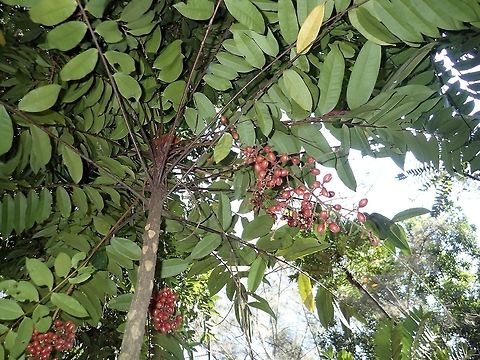
Appearance
A medium size slender shrub reaching 10 meters in height, often unbranched with reddish brown petioles. Leaves compound, even pinnate reaching 1 meter in length. Each compound leaf consists of 30-40 leaflets, lanceolate to obovate-lanceolate. Each leaflet is about 5–20 cm long, 1.5–6 cm wide, much paler on the ventral side. Inflorecense axillary, in large brownish red panicle, very pubescent with very fine, soft, grandular trichomes. Flowers are hermaphrodite. Petals small, very fine pubescent. Drupe hard, ovoid, yellowish brown when young and brownish red when ripe. The plant grows in the understorey of lowland forests, and survives on a variety of soils but prefers acidic, well-drained soil.Naming
''E. longifolia'' is also known by the common names ''penawar pahit'', ''penawar bias'', ''bedara merah'', ''bedara putih'', ''lempedu pahit'', ''payong ali'', ''tongkat baginda'', ''muntah bumi'', ''petala bumi'' ; Malaysian ginseng; ''bidara laut'' ; ''babi kurus'' ; ''cây bá bệnh'' ; ''tho nan'' ; ''lan-don'', ''hae phan chan'', ''phiak'', ''plaa lai phuenk'', ''tung saw'' ; "long jack" ; ''langir siam'' . Many of the common names refer to the plant's medicinal use and extreme bitterness. ''Penawar pahit'' translates simply as "bitter charm" or "bitter medicine". Older literature, such as a 1953 article in the ''Journal of Ecology'', may cite only ''penawar pahit'' as the plant's common Malay name.As mentioned above, ''E. longifolia'' is known by common names "tongkat ali" and "pasak bumi" in the South East Asian region, but these names are also used for the physiologically similar species ''Polyalthia bullata''. The bark and root of ''E. longifolia'' is more white/yellow-ish compared to the darker-colored ''P. bullata'', which has led to the former being known as "tongkat ali/pasak bumi putih" or "tongkat ali/pasak bumi kuning", and the latter as "tongkat ali/pasak bumi hitam". Indonesia also has a red-coloured variety known as "tongkat ali/pasak bumi merah" , which is being studied by researchers and has not had its species classified.
Status
''E. longifolia'' is mainly used for its roots, which necessitates uprooting the entire plant when it is harvested. This has led to concerns over the long-term sustainability of its use.In Malaysia, ''E. longifolia'' has been listed as one of the priority medicinal species for conservation, and the harvesting of wild trees is restricted according to Act 686 on International Trade in Endangered Species. In 2016, Ahmad Shabery Cheek, the Malaysian Minister of Agriculture, said that the species may go extinct within twenty years if cultivation and replanting efforts are not made quickly. Despite this, the Malaysian government has encouraged the commercialization of high-value herbal products based on this plant, notably in its 2010 Economic Transformation Programme, where Tongkat Ali is listed among the top five herbs to be developed on a large scale. To support this commercialization, the Malaysian government made attempts to encourage the long-term commercial cultivation of the plant, through the provision of grants for farmers, enabling agronomy research by MARDI, and the formation of cluster farms under the East Coast Economic Region.
Uses
The plant is used in the traditional medicine of Indonesia, Malaysia and Vietnam. In Indonesia and Malaysia, the root of the plant is boiled in water, and the water is consumed as a health tonic for post-partum recovery, as an aphrodisiac, as well as the relief of fever, intestinal worms, dysentery, diarrhoea, indigestion, and jaundice. In Vietnam, the flower and fruits are used to treat dysentery, and the root is used to treat malaria and fever. In Malaysia, a paste of the plant is applied topically to relieve headaches and stomach-aches.In modern times, ''E. longifolia'' is generally known as an aphrodisiac. Other health benefits attributed to this plant include antimalarial, antidiabetic, antimicrobial, and antipyretic activities. There has been some scientific research carried out on ''E. longifolia'' towards analyzing its benefits.
In Indonesia and Malaysia, ''E. longifolia'' has been widely commercialized. Its root, which is highly bitter, has been used as the basis for supplements, as well as food and drink additives. As a supplement, it has been marketed for the supposed benefits of sexual health improvement, as an energy and stamina booster, for improving blood circulation, and as a testosterone booster. In the drinks market, it is a common ingredient for coffee and functional beverages positioned as energy drinks.
References:
Some text fragments are auto parsed from Wikipedia.